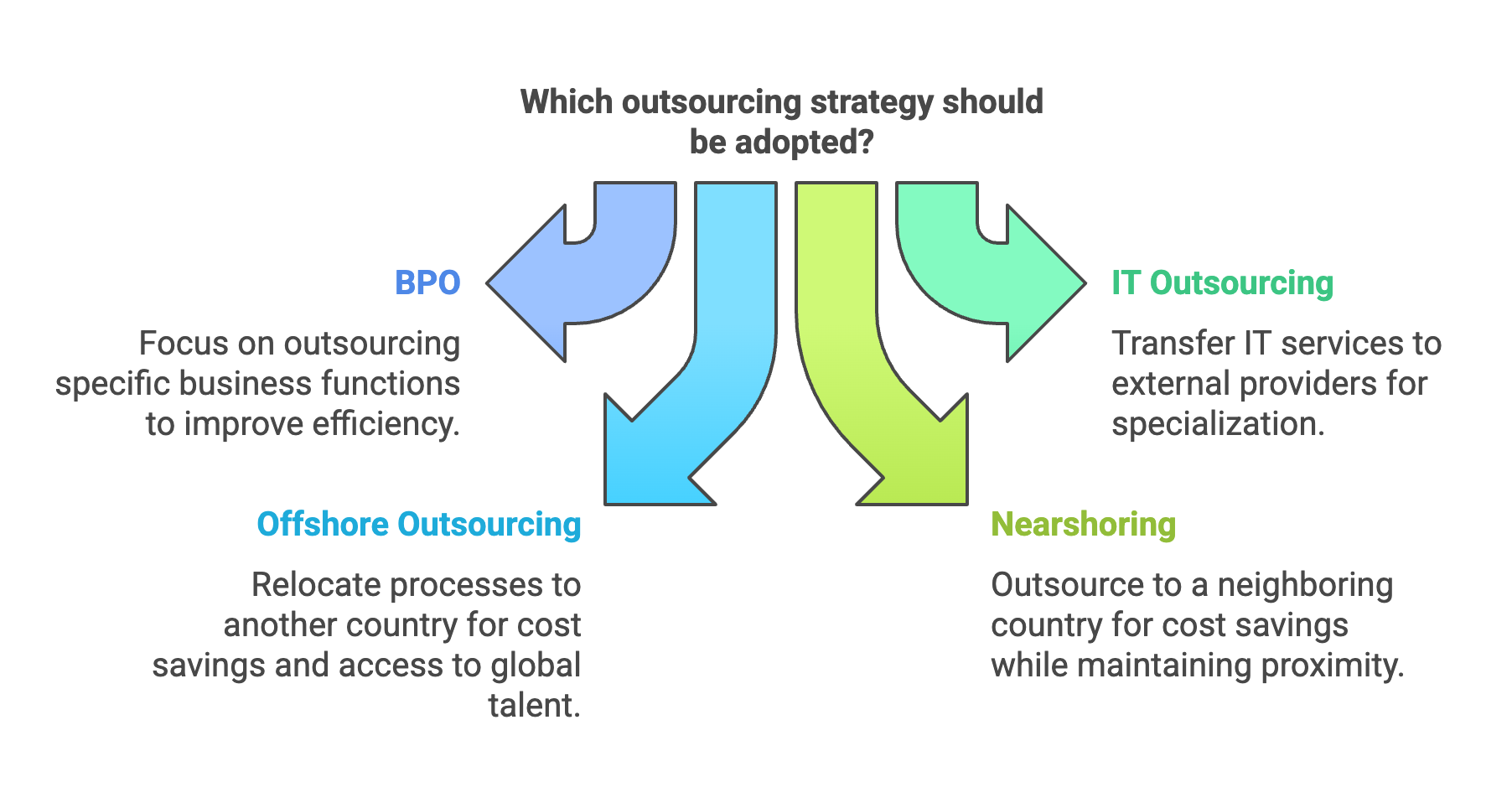Companies decide to outsource to reduce operational costs, access specialized expertise, and allow internal teams to focus on core business functions. By outsourcing non-essential tasks, businesses can enhance overall efficiency and productivity and overcome challenges such as high labor costs, the need for specialized skills that may not be available in-house, and the burden of managing various operational processes.
Outsourcing has become a growing trend among U.S. companies as it offers flexibility to scale operations quickly in response to market demands, enables access to global talent pools, and allows for better risk management in uncertain economic conditions. This trend reflects a strategic shift towards optimizing resources and improving competitiveness in an increasingly complex business landscape.
In the U.S., over 66% of companies with 50 or more employees engage in outsourcing, with the IT, financial services, and pharmaceutical industries leading the way. Specifically, 82% of pharmaceutical companies outsource some services, followed by 71% of financial service executives and about 70% of retail and transportation firms. The most commonly outsourced roles include IT services, customer service, and accounting, with small businesses often outsourcing tasks like digital marketing and human resources as well.
Interested in hiring global talents from Eastern Europe, South Africa, and Latin America? Schedule a call with a recruiting specialist today.
Besides answering the question: “When to outsource,” in this guide, we will also explain the term outsourcing and ways to outsource highly skilled professionals in offshore regions. We will focus on ways to reduce costs and improve the quality of work by hiring outsourcing service providers like Go Carpathian.
What Is Outsourcing?
Outsourcing is a business practice where companies delegate specific tasks or functions to external service providers instead of handling them internally, often to reduce costs, access specialized expertise, and improve efficiency. There are several types of outsourcing, including:
- Business process outsourcing (BPO): Business process outsourcing involves outsourcing specific business functions such as customer service, payroll, and human resources.
- IT outsourcing: Companies transfer IT services or functions, including software development, technical support, and network management, to external providers.
- Offshore outsourcing: This type involves relocating business processes to a different country, usually to take advantage of lower labor costs. Offshore outsourcing is one of the most beneficial types of outsourcing for business owners as it allows them to tap into the global pool of talents and keep the high quality of work while reducing costs.
Go Carpathian connects you to a pre-vetted, skilled workforce in Eastern Europe, South Africa, and Latin America. With Go Carpathian, business owners only get matched with professionals that suit their specific needs.
- Nearshoring: Similar to offshoring, the outsourced services are located in a neighboring country or within the same time zone.
- Onshore outsourcing: This type of outsourcing involves hiring external firms within the same country to manage certain business functions. The downsides of onshore outsourcing primarily include higher costs, as labor and operational expenses in developed countries tend to be significantly greater than those in offshore locations.
Benefits of Outsourcing
There are many benefits to outsourcing, with cost reduction and access to a global talent pool being among the most obvious ones. Here is a list of top reasons why offshore outsourcing might be a good option for your business:
Cost Savings
Outsourcing often reduces operational costs by allowing companies to leverage lower labor costs in different regions or countries. This enables businesses to access skilled professionals at a fraction of the cost of hiring full-time employees, ultimately leading to significant savings on salaries, benefits, and overhead expenses.
Businesses can save significantly on costs by outsourcing, with average annual savings estimated at $87,012, which equates to approximately an 85% reduction compared to hiring onshore employees. Specific areas of outsourcing yield notable savings, such as:
- IT Outsourcing: Potential savings of $6,474 per month (85%).
- Accounting Outsourcing: Savings around $6,248 per month (84%).
- Digital Marketing Outsourcing: Approximately $8,053 per month (87%).
- Development Outsourcing: Savings of about $8,507 per month (83%).
- Human Resource Outsourcing: Potentially $9,569 per month (91%).
Access to Specialized Expertise
By outsourcing, companies can tap into a global talent pool that offers specialized skills and knowledge that may not be available in-house. This access to experts allows businesses to enhance their service quality and innovate without extensive training or recruitment efforts.
Increased Focus on Core Activities
Outsourcing non-core functions enables businesses to concentrate on their primary objectives and strategic initiatives. Business owners can allocate more resources and attention to areas that directly contribute to their growth and success by delegating tasks such as customer service or IT support.
Scalability and Flexibility
Outsourcing provides businesses with the ability to scale operations quickly in response to changing market demands. Companies can easily adjust the level of outsourced services without the long-term commitment of hiring permanent staff, allowing for greater operational flexibility.
Enhanced Efficiency and Productivity
Outsourced teams often bring established processes and advanced technologies, which can lead to improved efficiency and productivity. By streamlining operations through outsourcing, businesses can achieve faster turnaround times and higher output quality, ultimately enhancing overall performance.
When to Outsource?
Usually, businesses start considering outsourcing when they face challenges such as limited internal resources, the need for specialized skills, or when operational costs become prohibitive. Signs that it’s time to outsource include struggling to meet deadlines, experiencing rapid growth that outpaces current capabilities, or needing to focus on core business functions while delegating non-essential tasks. Because deciding to outsource is not always easy, we focused on 5 main reasons to outsource:
1. You Need Time For Innovation
Having a business that grows fast is one of the best and most frightening feelings for business owners. While it is fantastic to see something you created grow, there are also many obstacles and challenges business owners face. With more growth comes more responsibility and that usually means a lack of time for innovation.
Time is one of the most valuable resources in every company, but if business owners keep wasting it on repetitive tasks, it’s probably time to think about outsourcing. Sustaining a business without being innovative with services is very challenging and can jeopardize any company’s success long term. That said, as a business owner, you should never let your company’s time get wasted on mundane work. Instead, you can outsource your tasks or entire departments and focus on core operations.
2. Your Team is Overwhelmed
If your team seems to be maxed out in their capacities, you should consider outsourcing a part of their tasks. The best way to check the status of your team is to ask them regularly about their workload and to track their progress. If their projects are coming to a stall, that is a definitive sign that you should consider outsourcing as a way to improve the quality of your work.
3. You Are Scaling Too Fast
If your team and the scope of work are growing too fast without control you might not be able to meet customers’ expectations and there is a big risk of delays and similar problems. This is an important sign that you should outsource certain tasks or even entire departments within your organization. With outsourcing, business owners can reduce costs, even though they are hiring more people to handle the larger scope of work. With outsourcing agencies like Go Carpathian, businesses can outsource their work to highly skilled talents from Eastern Europe, South Africa, and Latin America. These regions are outsourcing hubs that offer quality workforce that charges less compared to Western countries.
4. You Are Behind On Deadlines
If you have a deadline approaching and you are still behind, it might be time to consider outsourcing. As we mentioned before, you can either outsource certain tasks or entire departments, depending on your workload and access to specialized skills.
5. Your Skills and Needs Don’t Match
If your business doesn’t specialize in services like financial services, IT, web design, graphic design, and marketing, it might be a good idea to outsource these responsibilities to professional hires. With outsourcing, you get access to global talents specialized in various skills. Go Carpathian connects business owners with pre-vetted candidates that match their specific needs. This can save businesses a lot of time they would spend on looking for candidates that are not previously vetted on social media or online directories.
Do You Need Help With Outsourcing?
Business owners who have time to manage deadlines, workload, customer expectations, and the lack of time for growth and innovation should consider outsourcing their work. There are many benefits to outsourcing, such as access to highly skilled global talent, scalability, cost efficiency, and operational flexibility to focus on core tasks.
Are you considering outsourcing as an efficient way of growing your business? Go Carpathian can help you outsource your work offshore. We also offer ongoing support during the onboarding process of the new hires to ensure seamless integration.
We know you are busy. That’s why we made partnering with us extremely simple:
- Schedule a Discovery Call: Discuss your business needs and goals with their team.
- Submit an Onboarding Form: Provide detailed information about the roles you want to fill.
- Review Calibration Candidates: Evaluate pre-screened candidates to find the best fit for your business.
- Onboard and Start: Integrate your new team member(s) into your workflow and begin reaping the benefits of outsourcing.






